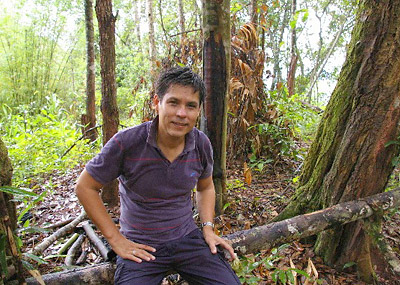
| Jacket 36 — Late 2008 | Jacket 36 Contents page | Jacket Homepage | Search Jacket |
This piece is about 4 printed pages long. It is copyright © Adam Aitken and Jacket magazine 2008.See our [»»] Copyright notice. The Internet address of this page is http://jacketmagazine.com/36/aitken-3p.shtml
Pol Pot in Paris
Oh happy child, kindly teacher–were you a fake?
Like you I’m taciturn
but when I give an order who’s to hear?
Paris, I found it cold but didn’t read very much.
No one knows what you thought of its weather,
the river, the churches or the metro.
You preferred a book on the Soviets to girls in Montmartre.
I too would rather recite Verlaine
than take notes on electronics.
If I had a history and traditions, I don’t remember.
Would you understand me?
I too lived on an allowance
of uncomfortable epithets
cobbled from Buddha and Marx:
“Physical beauty is an obstacle to the will to struggle.”
Late nights drinking weren’t your thing.
Sweet words of girls “mask evil hearts”.
A fun holiday on a tractor in Belgrade.
“The wheels of revolution never stop, roll on
to crush all who dare to walk in its path.”
We could have been lifetime friends, together
rooting out evil, picking mushrooms,
sipping coffee in the Latin Quarter,
mediocre, polite, soft spoken
migrants meandering in overcoats.
The others marry French girls, you join a work brigade
digging ditches in Zagreb.
In the 15th arrondissement, Rue Latellier
mid-winter, dog shit everywhere.
On the river it’s 20 francs
for La Grande Revolution Française.
We could’ve talked, taken notes for a memoir:
did you join the party before or after the festival
in East Berlin? Did you buy that shirt
before or after the coup d’état?
In Marseille you boarded the Jamaique.
Your tiny shadow cast a conspiracy
of epic dimensions, and there, in the oily backwash
and the silver wake, a complete solution.
I too went home, dreaming of a family
I would never have, and the one I would.
Letter to Marguerite Duras
The white trash girl in the second hand Fedora,
hardly fifteen, waits at the convent school gate.
(Once I taught a girl like you, from Hanoi, and rich.)
A Morris Léon Bolléé, black, appears;
at the wheel a white liveried driver.
On the concession it’s flat, sad, futureless.
A view of the mountains of Siam,
an oppressive heat of course.
Just like here, where I am writing this
sending your book back to you
across a sluggish canal of memory, writing to you.
White trash on a concession
and two brothers drunk on Cognac and Pastis,
one a killer, the other mostly mute.
A mother who’s lost her husband
in a way that’s not explained.
What else can I say, I love the way
the Chinese lover could never have you
and how he made love with a kind of grace
you’d call French if you believed it were true.
And there was Hélène Lagonelle
with her arms thrown up in surrender
sleeping with her legs apart
under the dormitory fan, just turning over, lazily.
I love the inversion, you were poor
and he was rich, his fate determined, an Oriental.
The way he sat there, head averted from humility,
in the back seat of the car.
I am him, I am you, and everyone’s talking about it.
No, there’s no point standing on the steamer’s deck
looking back down the river
to Saigon, slowly disappearing under the horizon.
Nothing’s explained, which is why
we’re slumped in the deckchairs, always reading.
Moral decay, a quagmire
leading to persistent drinking.
The weather’s vengeful collaboration.
History ends but love is endless,
dying but undying, always damp
and always just beginning.
Lines from The Lover
It was never a question of beauty but something else. Mind for example. For a long time you had no dress of your own, except those your mother had her servant make. Dô could sew with hair-fine needles, pleats and Peter Pan collars. She could make anything look timeless. Writing was sewing. Writing was taking an image–a ferry crossing the Mekong say, and empty it of all significance until it became idea, an image caught between memory and forgetting. We looked about for that place-marker for the time that never existed. The Mekong–that blood in the body, that slow flow between banks that had faded away. The river carries everything along, straw huts, forests, burnt-out fires, dead birds, dead dogs, drowned tigers and buffaloes, drowned men, bait, islands of water hyacinths all stuck together. Everything flows towards the Pacific, no time for anything to sink, all is swept along by the deep and headlong storm of the inner current, suspended on the surface of the river’s strength. And like a new-born child, it was blind, or so it seemed to the ungainly, the women from elsewhere, the mothers and the sons, mute and cowed in the presence of the father. And it was blind.

Adam Aitken, in Laos
Adam Aitken was born in 1960 and spent his early childhood in London, Thailand and Malaysia. As well as numerous articles on poetry, essays on Asian-Australian literature, and works of creative non-fiction, he is the author of four full length collections of poetry. He recently spent a year in Cambodia working on a new book of poems, ‘Eighth Habitation’ (Giramondo Publishing, due in 2009). He lectures at the University of Technology, Sydney.